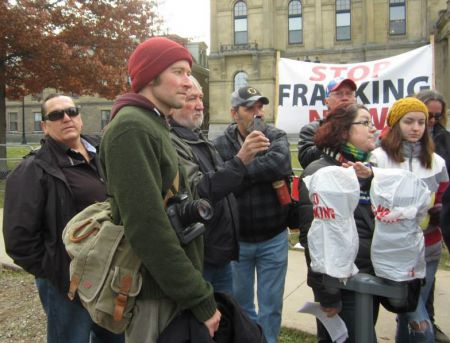K'JIPUKTUK (Halifax) - On February 27, the day before he was scheduled to appear in court in Moncton, Halifax Media Co-op journalist Miles Howe found out that the charges relating to his November 26 arrest had been dropped.
"It's always a relief," says Howe, who by this time is familiar with the feeling.
Howe has been arrested three times since he began covering anti-shale gas protests in New Brunswick less than a year ago. Each time, the charges were subsequently dropped, but Howe's ability to do his job as a journalist was significantly hindered in the interim.
The pattern raises questions about the RCMP's treatment of journalists that "get in the way," according to Hugo Rodrigues, president of the Canadian Association of Journalists.
"To use tactics that intimidate [journalists], such as arrest and charge, but then not follow through with the charge, or just arrest, or harrass–it becomes a pattern of behaviour," says Rodrigues. "It raises the legitimate question: Is he being targeted by the RCMP?"
In June 2013, Howe travelled to Elsipogtog to cover an emerging resistance to shale gas development in New Brunswick. Howe remained for two months, unable to leave what he felt was a critically important and quickly developing story.
In New Brunswick, Howe found a shale gas industry that was essentially guarded by the RCMP, and a people–at that time protesters were mostly Mi'kmaq–that were resisting by putting their bodies on the line. "There were people being arrested–sometimes in a violent manner–in front of me on a weekly basis and there was no other media to observe what was going on," says Howe.
All told, Howe spent about five months in Elsipogtog, filing stories for the Media Co-op on the RCMP's treatment of protesters, First Nations rights, the shale gas industry's impact on the environment, and the role of government.
Following his first and second arrest, after recovering his equipment and being released from jail, Howe resumed his job as a journalist. That pattern changed after his third arrest, when he was forced to sign conditions in order to be released from jail. Howe's conditions prohibited him from coming within one kilometer of protest sites, SWN’s (the shale gas company) equipment or SWN employees.
"In essence what that meant is it was impossible to do any degree of on the ground reporting," says Howe.
Not only did the conditions prevent Howe from covering the story, "that he's probably covered to a greater extent than many other journalists out there," says Rodrigues, but "we also have to ask how many other journalists were kept away."
Other journalists may not be willing to risk arrest and all that it entails in order to cover a story, says Rodrigues. "It has a chilling effect."
RCMP have also refused to return Howe's cell phone and camera since his November 26 arrest, saying that they may contain useful information for the RCMP.
In February, a provincial court judge granted a RCMP request to have access to videotape and photographs taken by five media organizations of anti-shale gas protests in New Brunswick in October.
This is a disturbing trend, says Rodrigues.
"When police run around and start seizing our equipment and raw footage, it makes it really difficult for us to be seen as anything but people who are there to help police, and that's not an appropriate way for journalists to be seen in a democratic society," says Rodrigues.
"We're not members of law enforcement, but if everything we do is subject–at law enforcement's whim–to be part of their investigation, it's really difficult for us as journalists to be able to continue to do our best work."



